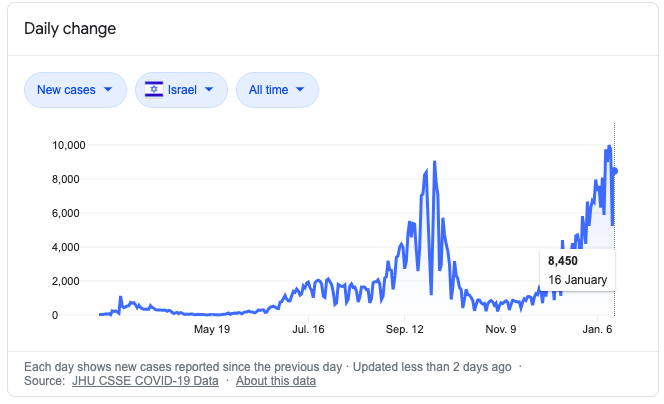Israel's reproduction number appears to have declined rather sharply in recent days, with around 25% of the country vaccinated, and some additional percentage having at least partial immunity via prior infection.
As noted previously, Israel is the country to watch for herd effects from the Pfizer vaccine because of its small population, small geographic size and rapid rate of immunization. We may be seeing this now.
A press-reported Clalit study that reports 33% vaccine efficacy after 14 days in over-60 year olds might seem surprising and disappointing, and in line with Peter Doshi's recent suggestion that Pfizer may have overstated vaccine efficacy in their trials. https://www.wsj.com/articles/israel-vaccine-data-suggests-decrease-in-covid-19-infection-rate-after-first-dose-11610658607
See here for Peter Doshi's recent piece: https://blogs.bmj.com/bmj/2021/01/04/peter-doshi-pfizer-and-modernas-95-effective-vaccines-we-need-more-details-and-the-raw-data/
In fact, I think low *effectiveness* (because we're not talking real-world, rather than trial-based *efficacy*) is probably auspicious. Remember that in the world of the trial, with limited numbers of individuals covered, we would have no expectation of herd effects.
In Israel, we have free mixing of (large numbers of) vaccinated individuals and unvaccinated individuals. In that setting, indirect/herd effects of immunization would decrease risk of infection in both vaccinated and unvaccinated individuals.
Estimated vaccine efficacy is a function of relative risk of infection in the vaccinated...when there is indirect protection via herd effects, we expect efficacy estimates to decrease because the risk among unvaccinated individuals declines.
As such, seeing a profound gap between trial based efficacy estimates and population-based effectiveness estimates in Israel is (to me) strongly suggestive of important herd effects.
From class slides for CHL5412 at @UofT_dlsph
From class slides for CHL5412 at @UofT_dlsph
We should know more this week!

 Read on Twitter
Read on Twitter



